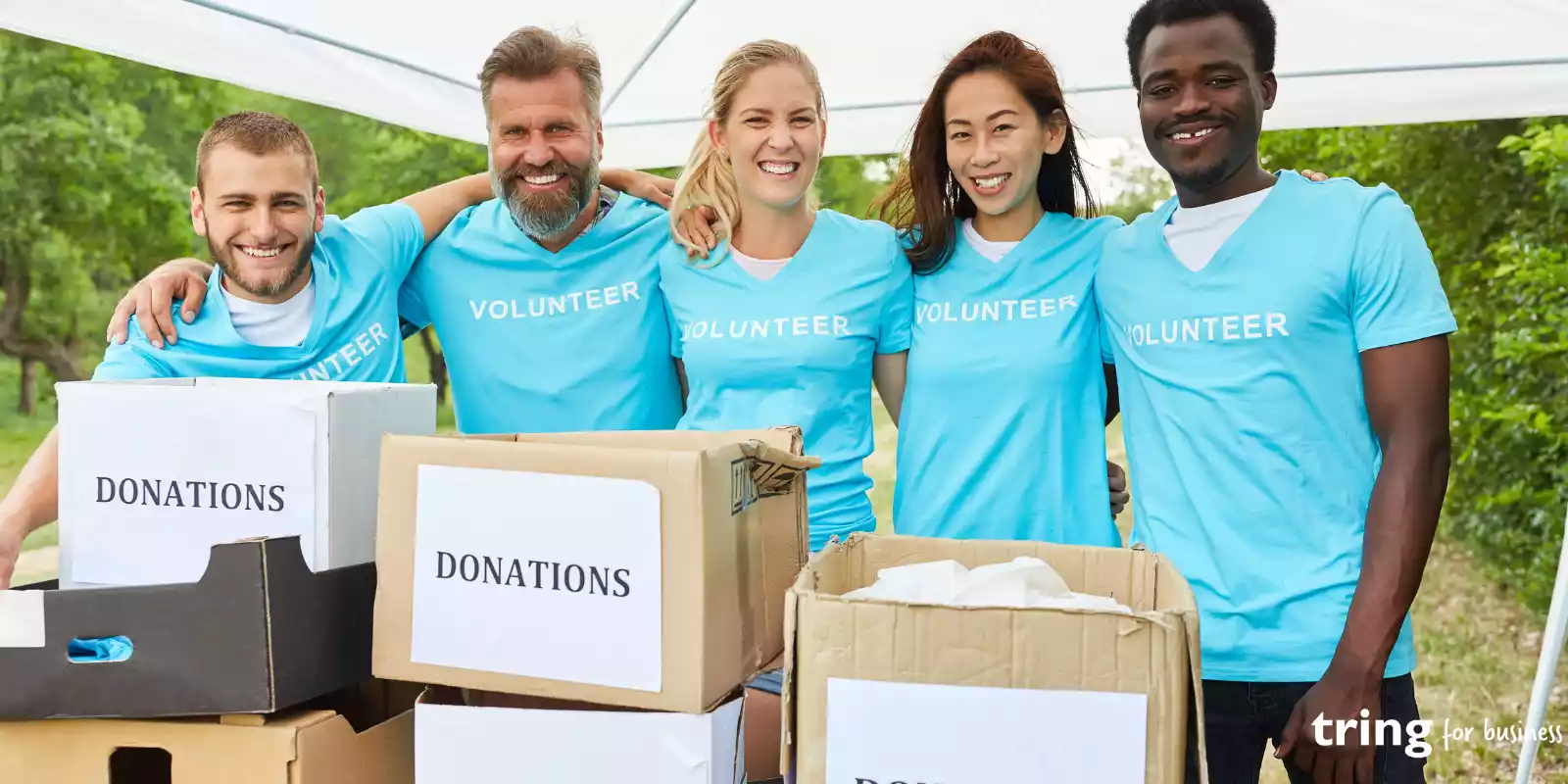What is a Fundraiser?
![What is a Fundraiser? What is a Fundraiser?]()
A fundraiser is an organized activity or event designed to raise money for a specific cause, organization, or project. Fundraisers can take various forms, including events like galas, auctions, bake sales, and charity runs, as well as online campaigns and crowdfunding efforts.
The primary objective is to gather financial support while engaging the community and raising awareness about important issues. Fundraisers often involve collaboration between individuals, businesses, and nonprofit organizations, creating a sense of shared purpose.
Through creative planning and execution, fundraisers not only provide essential funds but also foster community spirit and encourage broader involvement in meaningful causes.
Now that you got a gist of what fundraisers are, let’s find out how to organise one.
Do You Want a Celebrity to Appear at Your Fundraiser Event?
![fundraising-event-celebrity-appearance.png]()
How to Organise a Fundraising Event: 15 Effective Steps to Follow
Are you wondering how to organise a fundraising event for a nonprofit organization or a business you own? Don’t worry, we’ve got you covered.
Organizing a successful fundraising event requires careful planning and execution to effectively engage participants and maximize contributions. This guide will cover the top 15 essential steps to ensure your fundraising event is both enjoyable and effective.
1. Set Your Fundraising Event Goals
Setting clear goals for your fundraising event is crucial for its success. Start by defining specific, measurable, attainable, relevant, and time-bound (SMART) objectives. For instance, you might aim to raise a certain amount of money or attract a specific number of attendees. Consider tangible metrics like the number of attendees, donor acquisition, or funds raised.
This clarity helps align your team and provides a benchmark for evaluating success. A well-defined goal also motivates your team and attracts the right audience.
Beyond setting a clear revenue target, your nonprofit should also focus on awareness and engagement goals, such as:
-
Attracting new donors
-
Increasing visibility or publicity for your cause
-
Strengthening relationships with current donors
-
Engaging potential major contributors
-
Reconnecting with previous supporters
-
Honoring volunteers or recurring donors
-
Achieving specific engagement metrics, like impressions or likes on event-related social media content
These objectives help broaden your impact and build lasting connections with supporters.
2. Pick the Right Theme
Choosing the right theme for your fundraising event is crucial for attracting attendees and maximizing donations. A well-crafted theme not only reflects your cause but also enhances the overall experience, making it memorable for participants. Start by aligning the theme with your organization’s mission and the message you want to convey. For example, if you’re raising funds for education, a “Back to School” theme can resonate with your audience.
Consider the interests of your target demographic. Events that are engaging and fun, such as a gala with a “Roaring Twenties” theme or a community carnival, can draw larger crowds. Additionally, involving local businesses as sponsors can enhance the theme and provide mutual benefits. Incorporate creative elements like themed décor, activities, and entertainment to immerse attendees in the experience.
Finally, ensure that the theme is promoted effectively in your marketing materials to generate excitement. A captivating theme can transform your event from a simple fundraiser into a vibrant celebration that fosters community spirit and drives support for your cause.
3. Set a Budget
Setting a clear, comprehensive budget is a foundational step in organizing a successful fundraising event. This financial blueprint not only guides your planning process but also helps prevent overspending, ensuring that a maximum amount of funds raised are channeled towards your cause. Starting with an accurate estimation of expected expenses—such as venue rental, catering, entertainment, promotion, and any technological needs—is crucial. Equally important is forecasting your revenue from ticket sales, sponsorships, donations, and any additional fundraising activities planned for the event.
Incorporating a contingency plan within your budget, usually 10-15% of total expenses, can save you from unforeseen costs, ensuring flexibility and preparedness. Moreover, using technology, like digital ticketing and fundraising platforms, can streamline costs and enhance donation collection. Practical cost-saving strategies, such as securing in-kind sponsorships for goods and services, can significantly reduce expenses.
Ultimately, a well-planned budget not only keeps your fundraising event on track but also maximizes the impact of every dollar raised, contributing significantly to the success of your cause. Through careful planning, strategic analysis, and mindful spending, your event can achieve its financial goals while creating a meaningful experience for all involved.
4. Form a Committee for Fundraising Event Planning
The cornerstone of a successful fundraising event lies in the strength and organization of your planning committee. Assembling a dynamic team of dedicated individuals with diverse skill sets is critical. The most effective committees are composed of members who bring a range of talents to the table, from budgeting and finance to marketing, logistics, and community outreach.
When forming your committee, seek out individuals who are not only passionate about your cause but also bring practical experience and a network of potential sponsors and donors. Each member should have a clear understanding of their responsibilities and the overall goals of the event. Assigning specific roles such as a Treasurer, Marketing Coordinator, or Logistics Manager helps streamline the planning process, ensuring that every aspect of the event is meticulously managed.
Regular meetings leading up to the event are essential for tracking progress, sharing updates, and refining strategies. Through effective collaboration and a shared vision, a well-organized committee can create a more impactful and memorable fundraising event. Their combined efforts, expertise, and enthusiasm are the driving force that can turn a fundraising idea into a triumphant reality that benefits the cause and inspires the community.
5. Find a Location
Finding the perfect location is a pivotal decision in the planning process of any fundraising event. The choice of venue directly influences the event's ambiance, attendance, and ultimately, its success in raising funds. It's essential to select a location that aligns with the event's theme, accommodates the expected number of guests, and is accessible for attendees, including those with disabilities.
Start by considering the nature of your event. If it's a gala dinner, a banquet hall or conference center might be suitable. For a charity run, a park or closed-off city street could be ideal. The venue's capacity, parking availability, and proximity to public transportation should also be top considerations to ensure convenience for your guests.
Cost-effectiveness is another crucial factor. Many venues offer discounted rates for non-profit events or might be willing to negotiate in exchange for publicity. Additionally, exploring unconventional venues such as community centers, schools, or places of worship can offer more affordable options without compromising on the event's quality.
Remember, the right location not only sets the tone for the event but also plays a significant role in enhancing the attendee experience, encouraging generosity, and ensuring your fundraising event is a resounding success.
6. Set a Date and Time
![Set a Date and Time for Fundraising Event Set a Date and Time for Fundraising Event]()
Setting the date and time for a fundraising event is a decision with significant strategic implications. It's about striking a balance between ensuring maximum attendance and minimizing scheduling conflicts with other community events. Aim for a date that does not clash with major holidays, significant sporting events, or other local happenings that could detract from your attendance.
Consider your target audience when selecting a day of the week and time of day. If your event is targeting working professionals, a weekday evening or a weekend might be most practical. For family-oriented activities, a weekend afternoon could be ideal. Understanding the routine of your intended attendees can greatly influence turnout.
As you firm up the date and time, take into account the season and weather patterns, particularly if your event will be outdoors. This not only affects attendance but also the overall comfort and experience of guests.
It's wise to announce the date well in advance, leaving ample time for potential participants to save the date. Early announcements coupled with a strategic marketing plan can increase anticipation and attendance, thus maximizing fundraising potential and the success of your event.
7. Consult Other Fundraisers or Charity Groups
Consulting with other fundraisers or charity groups can significantly enhance the planning and execution of your fundraising event. Leveraging the wisdom and experience of those who have previously navigated similar challenges offers invaluable insights that can save time, money, and avoid potential pitfalls.
Start by reaching out to local charity groups or seasoned fundraisers within your community. These individuals often possess first-hand knowledge of what works and what doesn’t in terms of event logistics, audience engagement, and effective fundraising strategies. Learning from their successes and setbacks can help you refine your approach, making your event more effective and impactful.
Networking with other organizations can also open up opportunities for collaborations and partnerships. Such alliances could lead to sharing resources, splitting costs, and even doubling the attendee list, all of which can amplify the success of the event. Moreover, engaging with a network of charities can provide moral support and encouragement, which is invaluable during the high-pressure event planning stages.
Incorporating lessons learned from others, combined with a collaborative attitude, prepares you better to host a successful fundraiser that not only meets its financial goals but also leaves a lasting impression on all participants.
8. Get Corporate Sponsors
Securing corporate sponsors is a crucial step in elevating the reach, credibility, and financial success of your fundraising event. Corporations are often willing to support good causes, not only for philanthropy but also for the positive exposure and brand association it provides. To attract the right corporate sponsors, a tailored approach is key.
Begin by researching potential sponsors whose corporate mission aligns with your cause. A company with a history of supporting similar initiatives is more likely to be interested. When reaching out, make it clear how sponsoring your event offers them value, whether it's through brand visibility, community engagement, or association with a meaningful cause.
Craft a compelling sponsorship proposal that highlights the benefits to the sponsor, including logo placement, speaking opportunities, and VIP tickets. Be clear about the different levels of sponsorship available and what each tier offers. It's also beneficial to showcase previous successful events, attendee demographics, and how their contribution will make a difference.
Remember to emphasize the mutual benefits—how the sponsorship can help achieve their corporate social responsibility goals while supporting your fundraising efforts. Establishing a relationship built on shared values and mutual benefits can lead to long-term collaborations beyond a single event.
9. Recruit, Training and Manage Volunteers
Recruiting dedicated volunteers is the backbone of any successful fundraising event. Volunteers contribute to a wide range of tasks, from marketing and sales to event set-up and guest services. To build an effective volunteer team, begin with a clear outline of the event's objectives and the roles required. Utilize social media, community boards, and local organizations to reach potential volunteers who are passionate about the cause.
Once the team is assembled, thorough training is essential to ensure volunteers are well-prepared. Organize training sessions to walk them through their responsibilities, event schedules, and expected protocols. Emphasize the importance of their roles and how they contribute to the overall success of the event. Clear communication and providing all necessary information will empower your volunteers and foster a sense of team spirit and ownership.
Managing volunteers on the event day requires organization and flexibility. Designate team leaders for different areas and maintain an open line of communication. Be ready to address any questions and handle unexpected situations that may arise. Remember, recognizing their efforts and expressing appreciation is vital—not only does it boost morale, but it also helps to retain volunteers for future events.
10. Market Your Fundraiser
Marketing your fundraiser is essential to attract attendees, raise awareness, and ensure the success of your event. It involves a strategic mix of traditional outreach and modern digital marketing tactics.
Start by defining your target audience and construct your messaging to resonate with them. High-quality visuals, compelling stories, and clear calls-to-action should feature prominently in your marketing materials. Utilizing social media platforms is a cost-effective way to reach a broad audience. Create event pages, use consistent event-related hashtags, and consider investing in targeted ads to boost visibility.
Email marketing remains a powerful tool, especially for engaging past supporters. Customized messages with personal touches can foster a stronger connection to your cause. In the community, posters, flyers, and local media partnerships can also generate interest. Don't underestimate the power of word-of-mouth; encourage your supporters to spread the word among their networks.
Partnerships with local businesses, influencers, or celebrities can amplify your message. They can use their platforms to promote your fundraiser, expanding your reach further.
Remember to track the performance of your marketing efforts and adjust your strategy as needed. A well-executed marketing plan will not only enhance your fundraiser's profile but also drive donations and set the stage for future successful events.
11. Try Google Ad Grants for Free Advertising
![Google Ad Grants for Free Advertising - Tring Google Ad Grants for Free Advertising - Tring]()
Using Google Ad Grants for your fundraising event can be a game-changer in how you reach and engage potential donors. This unique program provides eligible nonprofit organizations free advertising on Google Search results, offering a substantial boost to promotional efforts without dipping into limited budgets.
Applying for Google Ad Grants requires that your organization holds valid charity status as defined in your country and adheres to the program's policies, including owning a high-quality website with substantial content. Once approved, you can utilize these funds to create ads that highlight your fundraising event, target specific audiences, and drive traffic directly to your event page or donation portal.
Crafting compelling ad copy is critical. Include clear calls-to-action, such as "Register Now," "Donate Today," or "Learn More About Our Cause." Regularly monitoring and optimizing these ads for performance will ensure you are reaching the right audience and maximizing the impact of this free advertising opportunity.
Google Ad Grants not only increases the visibility of your fundraising event but also enables you to experiment with different keywords and advertising strategies with no financial risk. It’s an invaluable resource for nonprofits looking to expand their digital footprint and maximize event attendance and donations.
12. Sell Tickets to Your Fundraising Event
Selling tickets effectively is critical to the financial success of any fundraising event. Begin by setting clear goals for both the number of tickets you aim to sell and the revenue you intend to raise. Pricing should be strategic; consider offering early-bird discounts to generate quick sales and maintain momentum as the event approaches. Also, think about creating different ticket tiers that provide various levels of access and perks, appealing to a broader audience.
Marketing your tickets involves a combination of digital and personal outreach strategies. Utilize your event website and social media channels to generate excitement and share consistent updates. Email campaigns can be particularly effective, especially when you segment your audience and tailor messages to different groups. Consider leveraging partnerships with local businesses and influencers to reach a wider audience and boost credibility.
Provide easy and accessible ways for people to purchase tickets. Online platforms make the transaction process seamless for potential attendees, and consider mobile optimization to enhance the user experience. Remember, every ticket sold is more than just revenue; it's an opportunity to grow your community and share your cause. Tracking sales and analyzing data from these efforts not only helps in adjusting your strategy in real time but also provides insights for future events.
13. Promote Your Fundraiser by Inviting a Famous Celebrity
Inviting a famous celebrity to your fundraiser can significantly amplify its reach and impact. Celebrities attract attention, and their endorsement can lend credibility and a sense of excitement to your event. Begin by identifying celebrities who have shown interest in your cause or have a history of philanthropy. Reach out with a personalized invitation that explains the importance of your fundraiser and the difference their presence could make.
Once a celebrity has agreed to attend, promote their involvement across all your marketing channels. This could include creating press releases for local media, leveraging social media posts or live videos featuring the celebrity, and highlighting their participation in email marketing campaigns. Utilize the celebrity’s image and quotes in promotional materials, ensuring you have their approval for all uses.
Celebrities can also be encouraged to promote the event to their own followers, exponentially increasing its visibility. They could share the event on their social platforms, mention it in interviews, or even perform or speak at the event.
However, it's crucial to maintain the focus on your cause. Ensure the celebrity’s involvement enhances the fundraiser rather than overshadowing the purpose behind it. Properly leveraging a celebrity's presence can boost ticket sales, donations, and overall awareness, making your fundraising event a resounding success.
Get a Celebrity for Promoting Your Fundraising Event
![Get Celebrities For Fundraising Event!.png]()
14. Check Your Logistics
Ensuring the smooth execution of your fundraising event hinges on meticulous logistical planning. A well-orchestrated event not only leaves a lasting impression but also significantly contributes to achieving your fundraising goals. Begin by crafting a detailed checklist that covers all facets of your event, from venue selection and setup to transportation and accessibility for attendees.
Key considerations include securing a venue that aligns with your event's size, theme, and technical requirements. Investigate its facilities, from parking availability to audio-visual equipment, ensuring it meets your needs. Adequate signage is vital for guiding guests and creating a seamless experience
Catering choices should accommodate a range of dietary preferences, highlighting your commitment to inclusivity. If your event involves ticket sales or donations, set up a streamlined process for payments and receipts, considering both online and on-site transactions.
Staffing and volunteer coordination are crucial. Ensure roles and responsibilities are clearly defined to prevent any confusion during the event. Safety protocols shouldn't be overlooked, including first aid provisions and emergency plans.
Finally, run through your plan with your team, conducting a walk-through if possible. This rehearsal can reveal potential issues, giving you ample time for adjustments. Remember, successful logistics management is about anticipating needs, solving problems before they arise, and creating a positive, memorable experience for all participants.
15. Follow Up with Attendees After Your Event
Following up with attendees after your fundraising event is a crucial step in cultivating long-term relationships and building a loyal donor base. A thoughtful post-event communication strategy not only shows appreciation but can also reinforce the impact of their contributions, encouraging future support.
Start by sending out a personalized 'thank you' email or message within 24 to 48 hours of the event's conclusion. Express gratitude for their presence and contributions, and include highlights such as the total funds raised and specific examples of how the money will be used. This can foster a deeper connection between your attendees and the cause.
Provide attendees with a survey to gather feedback. Understanding their experience can offer valuable insights for improving future events. Incorporate a few questions about what they found most meaningful and any suggestions they have – this shows you value their opinion and are committed to growth.
Social media can extend the conversation and engagement beyond the event. Share photos, videos, and stories, and encourage attendees to do the same with a dedicated event hashtag. Include calls to action for further involvement, whether it's signing up for a newsletter, volunteering, or attending another event.
Additionally, continue to share updates about the progress being made thanks to the funds raised. This transparency can help maintain interest and solidify the relationship between your organization and its supporters. Remember, a well-executed follow-up can turn a one-time attendee into a lifelong advocate for your cause.
Do You Want to Get a Celebrity Appearance at Your Fundraising Event?
Ready to elevate your fundraising event with a celebrity appearance?
Securing a star can vastly increase the visibility and success of your event. Don't miss out on this exciting opportunity!
Take the first step towards making your event the talk of the town. Talk to us now and make your fundraiser a grand success.
![button_talk-to-us.png]()
Discover More Events to Invite Celebrities!
![birthday occasion]() Birthday Gifts
Birthday Gifts
![anniversary occasion]() Anniversary Gifts
Anniversary Gifts
![women]() Women
Women
![men]() Men
Men
![Couples]() Couples
Couples
![Couples]() Wedding Gifts
Wedding Gifts

 Birthday Gifts
Birthday Gifts
 Women
Women
 Men
Men
 Anniversary Gifts
Anniversary Gifts
 Wedding Gifts
Wedding Gifts






 We now support international payments
We now support international payments
